#also in my opinion--mbti is a good way of being more introspective as well as a good way to find how to improve yourself if you do not know
Text
wait also there was this one ENTJ Mouche post a while back but also *grabby hands* YES
IN terms of stereotype, Y E S I agree
#me and the homies love ENTJs --it's me I'm homies and homies are also INFP hoho#peep peep#disclaimer: mbti's are strictly stereotype and should be treated as a theoretical way of someone's methods of communication and thought#also in my opinion--mbti is a good way of being more introspective as well as a good way to find how to improve yourself if you do not know#where to begin nodnodnod#but yes nothing is set in stone and humans are very much a vehicle of change. just because you are one type doesn't mean that won't change#as you grow and mature nodnod
2 notes
·
View notes
Text
BLUE LOCK MATCHUP — @quietwasteland
Your match is...



— Reo Mikage

✦ I hesitated a lot about the final suitor!
✦ We'll talk about it again at the end of the post.
✦ It's a very sweet bio :)
✦ Not for everyone, then…
✦ I see that at the bottom of your description, you're wondering between INFP and ENTP; I lean towards INFP based on all the behaviors you describe in your text.
✦ When they are comfortable, INFPs can seem extroverted to those who are even more introverted than they are, and especially, their imagination and sharp humor can make them seem like ENTPs.
✦ But it's by observing the person's behavior over time that you can determine their true nature.
✦ I’m betting on INFP.
✦ "I’ll match your energy, naturally shaping my vibes to get along with different people. I can be an introvert and extrovert and everything in between." This is very typical of Feeler (F) profiles who strive to maintain overall harmony and resonate with their surroundings. A Thinker (T) profile would tend to behave the same way regardless of the circumstances, valuing the efficiency of their discourse over the preservation of others' well-being.
✦ "And from what I know you’re East Asian too?" LMAO I didn't expect to see that! Yes, where did you get this info? LOL. So funny. Being Asian doesn't mean I know Eastern mythology and being European doesn't mean I know Western mythology. I just wanted to say that.
✦ "Can someone be observant and cloudy-minded?" Yes, and it's exactly what INFP's cognitive functions explain: the combination of the two functions Introverted Feeling (Fi) and Extraverted Intuition (Ne) creates a combo where the INFP gathers a lot of information from the outside world through their Auxiliary Ne and processes it extensively internally thanks to their Dominant Fi. This is what gives this profile the reputation of being a dreamy observer. They need a lot of time to process the vast amount of information gathered by their Auxiliary function, and this also explains why the INFP needs plenty of time alone to digest all of this. It's the sponge effect.
✦ AND SO. To wonderfully match this pairing: I usually suggest an MBTI profile that we call a "mirror", because you bring to each other what the other lacks. To simplify, it’s the MBTI profile that uses the same cognitive functions as you (in the case of the INFP: Fi-Ne-Si-Te), but in the opposite order, and with opposite orientations.
✦ The profile we are looking for is the ENTJ; their function stack being Te-Ni-Se-Fi.
✦ This means that unlike the INFP, the ENTJ is very good at taking action, setting up plans, and executing them -- or getting them executed. The ENTJ is a natural leader, structured and strategic. This profile often represents the traits that the INFP lacks, whose natural tendency pushes them towards sometimes excessive introspection, escaping into daydreams, procrastination, and a strong inclination towards idealization. Typically, this reminds me of your phrase: "Everybody I know says that I give off that childish, dreamy, head in the clouds vibe. I’ve been daydreaming since I gained consciousness."
✦ There are a few ENTJ characters in Blue Lock, but I leaned towards Reo because, in my opinion, he is one of the healthiest characters in the entire manga. Ambitious, sociable, and protective. His relationship with Nagi shows how much he cares for others. You can also see how Nagi drifting away from him devastates him both morally and psychologically.
✦ I think you probably met in an art gallery in France, specifically in the 16th arrondissement of Paris. At number 59 Avenue Foch, you’ll find a collection of over 7,000 Asian artworks.
✦ I can easily imagine Reo being drawn to culture from all angles because it feeds his knowledge and serves him in his business. But he’s probably not the best at detecting all the subtleties of a painting, nor at explaining the history, concept, origin, or chronology of the artist.
✦ That’s when you come into play with your massive cultural background and your ability to connect one sculpture to another. Competence is a trait that appeals to Reo, no matter where it lies. He’s not just into football, which makes him much more accessible than other characters whose lives revolve around the sport.
✦ Impressed by your knowledge, he puts his afternoon plans on hold to invite you to grab a bite in the capital. The cafés are ridiculously expensive in the center, but it’s the least he can do for learning so much.
✦ While you choose, he’s attentive to what you do, what you say. He remembers your order in case he invites you somewhere else again. It also helps him understand who he’s dealing with. Sweet, savory? Mild or spicy? Soft-boiled or poached eggs? He remembers it all.
✦ You have the dynamic of two knowledgeable people, interested in subjects that make you grow. He tells you about his goal of winning the World Cup, and you look at him not quite sure if he’s serious or not.
✦ Apparently, he is serious.
✦ You nod; you couldn’t mock someone’s dream. On the contrary, you like that Reo aims high and is willing to do whatever it takes to achieve it. His determination touches you and serves as a source of inspiration for your own projects. On the other hand, I can definitely see him being genuinely interested in what you do outside of the arts. He finds that your words are often imbued with a form of poetic innocence that he’s never actually seen in anyone. Having always been surrounded by strict parents, an expressionless best friend, and teammates driven by the desire to win.
✦ You are a rarity in his flashy, extravagant world.
✦ He’s totally the type to lean more and more over the table as the conversation captivates him.
✦ And his questions about what you like and what you do keep increasing as you slowly reveal your answers…
✦ Very quickly, Reo would open up to you. Partly because he feels safe with someone who isn’t directly connected to football; and because there’s something about you that makes him want to confide. He’d tell you about his unpleasant family situation but also about his ambitions that have led him to make sometimes questionable choices.
✦ In fact, he shows his authentic self to you, and that’s probably what touches you the most. That there’s no filter, no awkwardness in the conversation. You even end up completely drifting off the main topic to philosophize and reshape the world fifteen times over.
✦ Time flies, and you realize that you’ve been there for three hours. You’re even politely asked to free up your table because other customers are waiting. A little embarrassed, Reo apologizes, leaves a generous tip, and invites you to leave the café with him.
✦ I’m sorry to drive home the cliché, but he totally invites you to take a walk with him in the Jardin des Tuileries, a large French garden from the 17th century adorned with statues, including 18 bronze sculptures by Maillol.
✦ "I have an eye for beauty, especially the small, delicate, 'ordinary' type. You could say I live for those moments. A sunset. The sounds of autumn leaves crunching. The laughter of a child. The last phoenix flower hidden behind green branches. And I often view those small things in their symbolic meaning, everything could be a metaphor you know." He loves this a lot. On his side, Reo is very sensitive to beautiful things, loves grandeur and the flamboyant… So being around someone much more modest than him, who is capable of seeing beauty in the details, would intrigue him enormously. In fact, I think he’d be fascinated to meet someone with such an unusual, simple, and refined perception of things at the same time. You show him that you can appreciate and be content with the most ordinary things in life.
✦ And at the same time, he remains a man of competition. Being with you brings him remarkable serenity, like taking a breath of fresh air in a city filled with concrete, but eventually, the evening comes, after the sunset, when you have to part ways to return to your respective lives.
✦ Of course, he leaves you his phone number.
✦ "You’re welcome at my place whenever you want."
✦ Naturally in first class.
✦ "I love books, sweets, science fiction movies, and stuffed animals." It’s extremely cheesy, but just before leaving, he probably gives you an overpriced plush toy in the shape of a lion, his favorite animal. It’s so you won’t forget him… and so you won’t be too sad about his departure. Even though you haven’t spent much time together, you know how to remind each other.
✦ I’m watching you from my seat in the cinema, and the popcorn is very good.

A word about your match: At first, I thought of Kunigami, but I figured he’d be too restrictive for you, always setting boundaries, reminding you what to do, etc. I’d see him more as a big brother.

© TIGREBLVNC 2024 | AUGUST '24 MATCHUPS EDITION.
#reo mikage#bllk reo#mikage reo x reader#blue lock reo#mikage reo#reo x reader#bllk#bllk x reader#blue lock x reader#blue lock matchup#suo matchups
8 notes
·
View notes
Photo
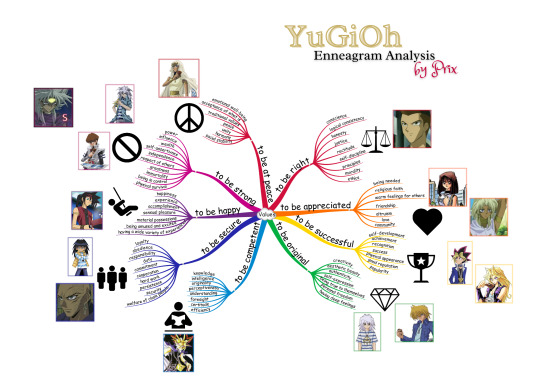
[ID: A chart describing the core values of each of the nine Enneagram personality types with YuGiOh characters correlated to each of the types.]
YuGiOh Enneagram Analysis, Part #1
Please note that this is the “boring” informational post about Enneagram with the Types listed and explained as well as a few other things. The next post is what has the actual, in-depth character profiles promised!
Introduction & Motivation
Over the past several months, I have been trying to analyze my strengths and weaknesses as a writer and learn more. I have been writing fanfiction since I was a little kid, making my first FF.net account in 2003 when I would have been twelve years old. Even before that, I was a lurker and wrote fics to share with my childhood best friend on paper or floppy discs.
YuGiOh came into my life at some point shortly thereafter. I know this, because I spent my thirteenth birthday in a comic book shop, mostly watching some of my male friends play the trading card game. I had some of the cards, but I was never much of a player, unable to keep up with the seemingly rapid rule changes. Besides that, I was always way more interested in the story and characters than I was in the card game. I remember I even wanted to call “YuGiOh cards” “Duel Monsters” instead to make it seem a little closer to tween-y LARPing.
Eventually, I gave up on collecting cards or trying to ply the game. I felt that while my male friends didn’t mind me being around when they played, they weren’t extremely interested in helping me learn or keep up. I felt I had other strengths, so I started carrying around a notebook even more than I already did. I started my fledgling forays into online fandom. And YuGiOh was a big part of the beginning of that.
I can’t remember posting any YuGiOh fic in particular, and I’m sure that if I had it would make me cringe now. What I do remember is reading some and also spending a lot of time lying on my bed, headphones plugged into a small purple stereo, listening to the first of the two American-released CDs with YuGiOh-inspired music on them. In particular, the last three tracks were pieces of music from the original score composed for the 4Kids dub, which is - for some reason - different from the original Japanese music.
During that time, I would fantasize and conjure my own YuGiOh plots in my head, most of which were focused on the Ancient Egyptian and more spooky, spiritual, and horror themes in the show. I was really fascinated with the reincarnation angle, though my understanding of and opinions on how that works have grown with time.
Years went by, and I didn’t think about YuGiOh much at all. Then, something happened in 2018. I don’t know what got in my head, but it was like all the joy I once found in thinking about the YuGiOh characters came back in a giddy conversation with my childhood best friend. Then, for a little while, it wouldn’t leave me alone.
I started writing for the fandom then, and after several detours, I’m trying to get back in the groove of it.
My approach to the tone of YuGiOh-fanning is that it’s a bit serious, but it’s also with a tongue placed in my cheek because of how incomprehensible or silly the plot can be on a meta level. Sometimes, it almost brings tears to my eyes by being so over-the-top about something that, in the real world, would make no sense at all. But the drama, in the context of the universe, somehow rings true.
I think that’s all owing to how most of the primary characters are just... really freaking great characters.
It has often puzzled me. Like, did Takahashi do all this layering on purpose? Is it really there, or did earnest fanon just make it seem like it? And, as a person, I am always here for a good fan-and-canon symbiosis.
This post is going to be, from here on, an effort to match the YuGiOh characters to the 9 Enneagram Personality Types. I am writing this for my own benefit as I continue to work on my pet YuGiOh fanfiction project, It’s Always Sunny in Domino City, which is a mixture of YGOTAS-vibes-and-concepts taken seriously and a sincere take on fanfiction for the actual canon. It’s dramedy about a sizeable chunk of the main cast a few years post-canon with some canon divergence such as the Memory World arc not yet and possibly never-happening. If that sounds like something you’d like, I would humbly request you check it out!
Either way, this will be an in-depth character analysis cheatsheet for all of the characters above, based on my observations, opinions, and feelings. I invite discussion, but it’s fine if we need to agree to totally disagree!
If you are interested and enjoy what’s below the Read More and in the coming second post, then you are welcome to utilize the character analyses to aid you in your own fanwork!
Enneagram
What is Enneagram, and why am I using it?
Enneagram is a personality categorization system that one might compare to the somewhat better-known MBTI. However, in the words of excellent writing-advice YouTuber, Abbie Emmons:
MBTI shows us how we behave.
Enneagram shows us what we believe.
I will be referencing Abbie’s video Using The ENNEAGRAM To Write CONFLICTED CHARACTERS and her free Enneagram-cheatsheet, available in the description of the linked video. Whether it’s before you continue reading or after, if you’re interested in writing, I would highly recommend you check out her channel!
The Enneagram system has nine basic personality types that overlap and interact in really interesting ways. It is not a hard science, and it’s not a horoscope. Instead, it’s supposed to be “based on conventional wisdom and modern psychology.” All I can say is that with every set of characters I’ve tried it with, it works! Once you get the hang of it, it feels kind of like ~✰~magic~✰~!
Below, I will list Abbie’s simplified definitions of each of the personality types, in order:
Type 1: The Reformer
The Rational, Idealistic Type:
Principled, Purposeful, Self-Controlled, and Perfectionistic
Basic Fear: Of being corrupt/evil, defective
Basic Desire: To be good, to have integrity, to be balanced
Key Motivations: Want to be right, to strive higher and improve everything, to be consistent with their ideals, to justify themselves, to be beyond criticism so as not to be condemned by anyone.
Type 2: The Helper
The Caring, Interpersonal Type:
Generous, Demonstrative, People-Pleasing, and Possessive
Basic Fear: Of being unwanted, unworthy of being loved
Basic Desire: To feel loved
Key Motivations: Want to be loved, to express their feelings for others, to be needed and appreciated, to get others to respond to them, to vindicate their claims about themselves.
Type 3: The Achiever
The Success-Oriented, Pragmatic Type:
Adaptable, Excelling, Driven, and Image-Conscious
Basic Fear: Of being worthless
Basic Desire: To feel valuable and worthwhile
Key Motivations: Want to be affirmed, to distinguish themselves from others, to have attention, to be admired, and to impress others.
Type 4: The Individualist
The Sensitive, Introspective Type:
Expressive, Dramatic, Self-Absorbed, and Temperamental
Basic Fear: That they have no identity or personal significance
Basic Desire: To find themselves and their significance (to create an identity)
Key Motivations: Want to express themselves and their individuality, to create and surround themselves with beauty, to maintain certain moods and feelings, to withdraw to protect their self-image, to take care of emotional needs before attending to anything else, to attract a "rescuer."
Type 5: The Investigator
The Intense, Cerebral Type:
Perceptive, Innovative, Secretive, and Isolated
Basic Fear: Being useless, helpless, or incapable
Basic Desire: To be capable and competent
Key Motivations: Want to possess knowledge, to understand the environment, to have everything figured out as a way of defending the self from threats from the environment.
Type 6: The Loyalist
The Committed, Security-Oriented Type:
Engaging, Responsible, Anxious, and Suspicious
Basic Fear: Of being without support and guidance
Basic Desire: To have security and support
Key Motivations: Want to have security, to feel supported by others, to have certitude and reassurance, to test the attitudes of others toward them, to fight against anxiety and insecurity.
Type 7: The Enthusiast
The Busy, Variety-Seeking Type:
Spontaneous, Versatile, Acquisitive, and Scattered
Basic Fear: Of being deprived and in pain
Basic Desire: To be satisfied and content—to have their needs fulfilled
Key Motivations: Want to maintain their freedom and happiness, to avoid missing out on worthwhile experiences, to keep themselves excited and occupied, to avoid and discharge pain.
Type 8: The Challenger
The Powerful, Dominating Type:
Self-Confident, Decisive, Willful, and Confrontational
Basic Fear: Of being harmed or controlled by others
Basic Desire: To protect themselves (to be in control of their own life and destiny)
Key Motivations: Want to be self-reliant, to prove their strength and resist weakness, to be important in their world, to dominate the environment, and to stay in control of their situation.
Type 9: The Peacemaker
The Easygoing, Self-Effacing Type:
Receptive, Reassuring, Agreeable, and Complacent
Basic Fear: Of loss and separation
Basic Desire: To have inner stability, "peace of mind"
Key Motivations: Want to create harmony in their environment, to avoid conflicts and tension, to preserve things as they are, to resist whatever would upset or disturb them.
Now that you’ve seen all those, what do you think your favorite character is? In YuGiOh or anything else! It works great for original characters and even yourself and your loved ones.
The actual Character Profiles will be in coming post(s), but continue reading if you want me to explain more about how and why the Enneagram is a great personality typing system. #nonspon, or whatever.
The Enneagram Chart
Now, you could just go to the Enneagram Institute’s page on How the System Works, but below I’ll cut it down to only the parts I’m interested in and explain those in a way that helps me.
Unlike in astrology or MBTI, which are both more restrictive in different ways, the relative position of each type matters a bit on the Enneagram chart, because it can be used to visualize a lot of things about a person!
The Basic Chart
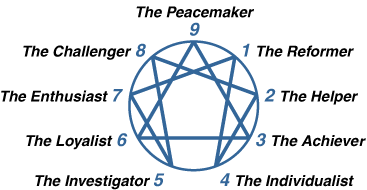
The Types are shown in a clockwise fashion with “1″ in the 1 o’clock position on an analog clock. The interior lines mean things, but I have trouble reading it without further delineation.
Centers of Response
Below are two small charts, displayed side-by-side. (If it’s too small, try right-click, open in new tab!)
The chart on the left shows the three “centers.” The “centers” indicate the first ‘processing language’ a person would use to respond to stimuli.
Type 8, Type 9, and Type 1 respond first based on instinct (primal, gut-feeling). If you want to go Freudian, this is from the id.
Type 2, Type 3, and Type 4 respond first based on feelings (social or personal desires, the heart). If you want to go Freudian, this is from the ego.
Type 5, Type 6, and Type 7 respond first based on thoughts (analytical rather than emotional, the head). If you want to go Freudian, this is from the superego.
Remember that, of course, every single type and person engages their instincts, their emotions, and their thoughts at different times and to different degrees, and some of these are learned or changed behaviors. This is about what their innate drive toward that would be.
Likewise, the same “centers” can also be used for the chart on the right. You will notice that all three of these are defined by what is typically considered a negative emotion. This is because this is about a person’s instinctive, not particularly conscious emotional response when they are backed into a corner and deprived of something that is core to the needs of their personality type.
Type 8, Type 9, and Type 1 tend to respond to a threat to their psychic well-being with anger/rage.
Type 2, Type 3, and Type 4 tend to respond to a threat to their psychic well-being with shame.
Type 5, Type 6, and Type 7 tend to respond to a threat to their psychic well-being with fear.

Stress vs. Growth
We all know that there are times when a person isn’t acting like themselves, for better or for worse. Usually, “You’re not acting like yourself,” means that a person is behaving badly. Of course, it’s way easier to withdraw and bristle and defend rather than growing in the midst of adversity. However, it is certainly possible to experience character growth in response to experiences, good and bad. Unlike a lot of other personality typing schemes, the Enneagram has a way to display and predict what stress and growth do to a person.
The Enneagram never suggests that any Type is an island unto itself. Every person contains multitudes, but a person’s Type is likely to remain relatively stable throughout their lives, once they have had a chance to develop any personality at all. This means that when a person is stressed or growing that they do not become the type they emulate. Rather, they are more highly expressing that aspects of their personality that reflect those drives and desires but in a way that is either fraught, sickly, or unwell (in the case of stress), or aspirational, flying-high, and incorporating the hard-lessons into who a person is going to be going forward (in the case of growth). The latter, especially, isn’t a sustainable mode, while a stressed person can become more entrenched in their bad habits and defensive coping mechanisms.
Stress
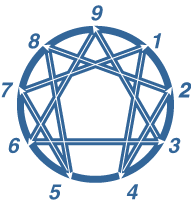
Note the white, directional arrows. Each number has an arrow point pointing to it and an arrow leading away from it. The point indicates that this is the stress manifestation for the Type at the origin of that arrow. The origin of each arrow indicates the Type being described.
Confused? Let me finally give you a YuGiOh example.
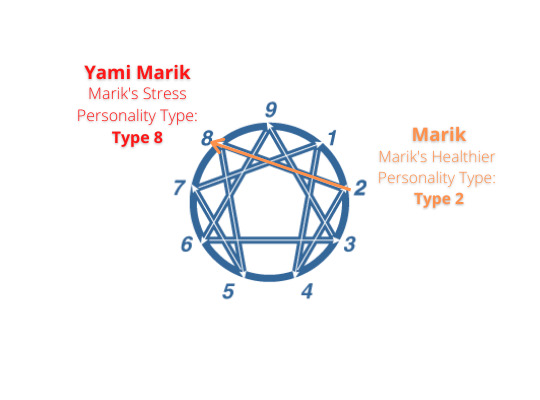
When I was trying to identify the Types of the characters, defining Marik was difficult, because he has a “Yami,” or Dark Side, which has its own personality and will but which is not its own separate soul or person than Marik himself. Rather, it’s a kind of fantasy/magic-assisted personality splintering where Yami Marik is a full manifestation of the negative traits Marik needed to embody to survive.
So, for reference:
When stressed, Type 1 behaves more like Type 4.
When stressed, Type 2 behaves more like Type 8.
When stressed, Type 3 behaves more like Type 9.
When stressed, Type 4 behaves more like Type 2.
When stressed, Type 5 behaves more like Type 7.
When stressed, Type 6 behaves more like Type 3.
When stressed, Type 7 behaves more like Type 1.
When stressed, Type 8 behaves more like Type 5.
When stressed, Type 9 behaves more like Type 6.
Alternatively, you can use these sequences to follow the stress lines:
1-4-2-8-5-7-1
9-6-3-9
Growth
Think of the above-explanation in reverse.
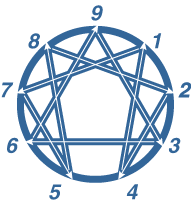
The sequence:
1-7-5-8-2-4-1
9-3-6-9
As a Type 1 grows, they incorporate more positive traits of Type 7.
As a Type 2 grows, they incorporate more positive traits of Type 4.
As a Type 3 grows, they incorporate more positive traits of Type 6.
As a Type 4 grows, they incorporate more positive traits of Type 1.
As a Type 5 grows, they incorporate more positive traits of Type 8.
As a Type 6 grows, they incorporate more positive traits of Type 9.
As a Type 7 grows, they incorporate more positive traits of Type 5.
As a Type 8 grows, they incorporate more positive traits of Type 2.
As a Type 9 grows, they incorporate more positive traits of Type 3.
Wings
The final thing to know about the Enneagram chart for my purposes is about wings. The wing of your personality traits accounts for the complementary and contradictory aspects of your personality. They are the inconsistencies that make you human, predicted and jumped in. Typically, a person is not thought to have both possible wings but one or the other. A wing is one of the two adjacent Types to yours, the number before, or the number after, and it is annotated, for example:
Type 1, Wing 2: 1w2
Type 1, Wing 9: 1w9
Link to Part 2 Here!
#yugioh#yugi mutou#seto kaiba#jounouchi katsuya#yugioh duel monsters#mutou yugi#kaiba seto#kaiba mokuba#mokuba kaiba#kujaku mai#mai kujaku#anzu mazaki#mazaki anzu#katsuya jounouchi#marik ishtar#isis ishtar#rashid ishtar#hiroto honda#honda hiroto#ryou bakura#bakura ryou#yami bakura#yami marik#yami yugi#pharaoh atem#atem#ryuji otogi#otogi ryuji#main cast#op
37 notes
·
View notes
Text
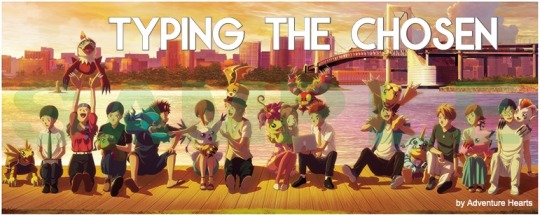
( PART 1: DA + ASTROLOGY )
PART 2: DIGIMON ADVENTURE + MBTI
Taichi - ESTP
Yamato - INFP
Sora - ENFJ
Koushirou - INTJ
Mimi - ESFP
Jou - ISTJ
Takeru - ENFP
Hikari - ISFP
Daisuke - ESFP
Miyako - ENFP
Iori - ISTJ
Ken - INFJ
Discussion and Commentary below!
If you’ve read some of my previous headcanons about the MBTI, and in particular this very popular post from four (!) years ago, you may find I’ve changed my mind a lot.
An important thing about this typology (or any other one, really) is that it’s quite easy to just look into some websites and make decisions based on the keywords used to describe each type. Which is what I used to do. Keywords are helpful to help us get the “basic picture” (hence why I quote them in this post), but now I believe that you have to read actual theory in order to understand the subtle differences between each type and make more educated guesses.
Since then, I’ve been reading more deeply into MBTI and the Functions. Consequently, the way I understand the MBTI has changed significantly, and so have my Headcanons.
It’s been particularly interesting to learn about the Inferior Function, or the “dark side” of each personality type. The more I read about it, it became surprising that how it seemed to describe most of the adventure kids’ characters arcs incredibly well. This is another reason why the combination Chosen Children + MBTI is such a fascinating and fun thought exercise!
It should be noted that different authors can have widely different interpretations of types, which is why, for the sake of simplicity and coherence, I’ve only read 3-4 main sources when preparing this post. And I tried stay away from popular MBTI websites and resources that exist around the internet, most which can have a slightly misleading/superficial vision of each type.
However, this doesn’t mean my HCs are “RIGHT” or that other people can’t have better ideas. I’m as biased about the characters as anyone else. I’d be very happy to hear alternative takes!
***
Taichi - ESTP
Dominant function: Se
Flexible and tolerant, they take a pragmatic approach focused on immediate results. Theories and conceptual explanations bore them - they want to act energetically to solve the problem. Focus on the here-and-now, spontaneous, enjoy each moment that they can be active with others. Enjoy material comforts and style. Learn best through doing.
Taichi is pretty easy to type, and most ESTP descriptions fit him nicely. Thompson notes the archetype of ESTP is James Bond and Xena the Warrior Princess; I think the character of Taichi, who represents Courage, fits in the same tradition — a bold, impulsive, adventurous leader who is good at strategizing and is able to make though decisions, but is is also very charismatic and charming.
Taichi’s tendency to become thoughtful, introspective, and indecisive under stress can be explained by the inferior function, Ni.
Yamato - INFP
Dominant function: Fi
Idealistic, loyal to their values and to people who are important to them. Want an external life that is congruent with their values. Curious, quick to see possibilities, can be catalysts for implementing ideas. Seek to understand people and to help them fulfill their potential. Adaptable, flexible, and accepting unless a value is threatened.
By contrast, Yamato is always the most difficult to type! I ended up using INFP rather than INFJ, because I think it makes more sense for his dominant function to be Fi (introverted feeling): “Due to the introverted nature of Fi, INFPs’ status as feelers is not always evident from without. When immersed in Fi, they can seem a bit cool, aloof, or indifferent.“ (Drenthe). This type is pretty well representative of Yamato’s caring, passionate and caring side, and especially his conflict during Adventure is beyond, his search for self and meaning.
Yamato’s more critical, aggressive, angry, and impetuous side is easily explained by him falling under the influence of the inferior function of this type, Te.
Sora - ENFJ
Dominant function: Fe
Warm, empathetic, responsive, and responsible. Highly attuned to the emotions, needs, and motivations of others. Find potential in everyone, want to help others fulfill their potential. May act as catalysts for individual and group growth. Loyal, responsive to praise and criticism. Sociable, facilitate others in a group, and provide inspiring leadership.
Another character who’s relatively difficult to type. I see Sora as being in the middle of many of the Preference axis, hence why I initially typed her as something pretty difference different. But now I’m pretty convinced her dominant function is Fe, even though she’s probably only 51% Extroverted. She leans more towards iNtuition than Sensing: Sora’s definitely someone who can pick up things intuitively, especially when it comes to human relationships. So, ESFJ could probably work as well, but I see her as more of an NF type than a SJ type.
Sora’s tendency to become hypersensitive, stubborn and withdrawn when under stress? That’s the inferior function, Ti.
Koushirou - INTJ
Dominant function: Ni
Have original minds and great drive for implementing their ideas and achieving their goals. Quickly see patterns in external events and develop long-range explanatory perspectives. When committed, organize a job and carry it through. Skeptical and independent, have high standards of competence and performance - for themselves and others.
This is an example of how learning more about Functions made me change my mind! I believe Koushirou is the text-book definition of INTJ and the Ni function. Koushirou isn’t just someone who thinks — he creates knew knowledge and connects theoretical possibilities.
One of the effects of the inferior function of this type, Ni, is an “Obsessive focus on external data”, which means that they can become obsessed with controlling small details, which is what Koushirou tends to do under stress.
Mimi - ESFP
Dominant function: Se
Outgoing, friendly, and accepting. Exuberant lovers of life, people, and material comforts. Enjoy working with others to make things happen. Bring common sense and a realistic approach to their work, and make work fun. Flexible and spontaneous, adapt readily to new people and environments. Learn best by trying a new skill with other people.
Mimi is a rather obvious fit for this type, not only with her bubbly and happy exterior, but also her naïveté and compassion towards others (Crest of Purity).
Jou - ISTJ
Dominant function: Si
Quiet, serious, earn success by thoroughness and dependability. Practical, matter-of-fact, realistic, and responsible. Decide logically what should be done and work toward it steadily, regardless of distractions. Take pleasure in making everything orderly and organized - their work, their home, their life. Value traditions and loyalty.
Jou’s type seems pretty straightforward. The characteristics of this type to fit him (and the Crest of Honesty) very well.
The inferior Function of this type is Ni, manifested as impulsiveness and catastrophizing — classic Jou moves whenever he looses his cool.
Takeru - ENFP
Dominant function: Ne
Warmly enthusiastic and imaginative. See life as full of possibilities. Make connections between events and information very quickly, and confidently proceed based on the patterns they see. Want a lot of affirmation from others, and readily give appreciation and support. Spontaneous and flexible, often rely on their ability to improvise and their verbal fluency.
Takeru is REALLY hard to type. Mostly because, just like his brother, he isn’t as transparent as he seems. Behind that charming, open, happy façade, Takeru runs deep. I ended up choosing ENFP is described as the most optimistic of all types (Crest of Hope), and they are very charismatic and inspiring as well.
The “dark side” of this type can be hopelessness or depression (see also: tri. Chapter 3!)
Hikari - ISFP
Dominant function: Fi
Quiet, friendly, sensitive, and kind. Enjoy the present moment, what's going on around them. Like to have their own space and to work within their own time frame. Loyal and committed to their values and to people who are important to them. Dislike disagreements and conflicts, do not force their opinions or values on others.
Hiakri is another one whose type isn’t obvious, but maybe for different reasons than the other characters I hesitated about — we just don’t see enough of her. I think you can make a strong argument for her being an Intuitive type, but ultimately I think Fi represents her better.
Daisuke - ESFP
Dominant function: Se
I know it’s reductive to say Daisuke and Taichi have different personality type, but that’s easy to understand if you see them as being in different stages of type development.
Miyako - ENFP
Dominant function: Ne
I’ve always thought Takeru and Miyako are pretty alike, hence why I think they would both fit this type.
Iori - ISTJ
Dominant function: Si
Again, Iori and Jou are pretty alike, although at different stages of their personality development. I could see Iori a ISTP/ISTJ, too — to be fair, I haven’t made up my mind totally about him.
Ken - INFJ
Dominant function: Ni
Seek meaning and connection in ideas, relationships, and material possessions. Want to understand what motivates people and are insightful about others. Conscientious and committed to their firm values. Develop a clear vision about how best to serve the common good. Organized and decisive in implementing their vision.
I’m just going to go and give Ken INFJ, although I’m not entirely sure it is the best fit. Ken is incredibly complex, but Ni seems to describe him fairly well.
And certainly, the “dark side” of Ni, Se, can very well explain why Ken developed his Digimon Kaiser persona.
BONUS
A brief summary of the 8 Functions:
Introverted Intuition (Ni) collects conscious and subconscious information, and then synthesizes it to produce convergent impressions, insights, answers, and theories. It sees deep causes, patterns, and laws underlying sense data. It is characteristically penetrating and insightful.
Extraverted Intuition (Ne) surveys and creatively recombines a breadth of ideas, associations, patterns, and possibilities. It is characteristically innovative, divergent, open-ended, and non-discriminating. Outwardly, Ne users may present as scattered, random, quirky, witty, and ideationally curious.
Introverted Sensing (Si) retains, consolidates, and recollects historical and autobiographical information. It attends to and draws on a concentrated body of past experiences, routines, and traditions (i.e., the “tried and true”). It forgoes the constant pursuit of new or broad experiences, finding safety and security in stability and consistency. It also surveys inner bodily sensations.
Extraverted Sensing (Se) seeks extensive outer stimulation in the “here and now”—new sights, sounds, tastes, experiences, etc. It is open-ended and non-discriminating with respect to new experiences. It can also be associated with image-consciousness and observation skills, displaying a keen eye for detail. Outwardly, it may manifest as a recurrent desire for activities beyond talking (“Let’s do something!”).
“Introverted Intuition (Ni) collects conscious and subconscious information, and then synthesizes it to produce convergent impressions, insights, answers, and theories. It sees deep causes, patterns, and laws underlying sense data. It is characteristically penetrating and insightful.
Extraverted Intuition (Ne) surveys and creatively recombines a breadth of ideas, associations, patterns, and possibilities. It is characteristically innovative, divergent, open-ended, and non-discriminating. Outwardly, Ne users may present as scattered, random, quirky, witty, and ideationally curious.
Introverted Sensing (Si) retains, consolidates, and recollects historical and autobiographical information. It attends to and draws on a concentrated body of past experiences, routines, and traditions (i.e., the “tried and true”). It forgoes the constant pursuit of new or broad experiences, finding safety and security in stability and consistency. It also surveys inner bodily sensations.
Extraverted Sensing (Se) seeks extensive outer stimulation in the “here and now”—new sights, sounds, tastes, experiences, etc. It is open-ended and non-discriminating with respect to new experiences. It can also be associated with image-consciousness and observation skills, displaying a keen eye for detail. Outwardly, it may manifest as a recurrent desire for activities beyond talking (“Let’s do something!”).
“Introverted Thinking (Ti) utilizes deep and nuanced logic to examine techniques, problems, concepts, or theories. It seeks self-regulation and self-optimization through the development of personal skills, methods, and strategies. It takes a skeptical and reductive approach toward knowledge.
Extraverted Thinking (Te) uses explicit logic, including standardized methods, measurements, policies, and procedures, to make systems and operations more rational, efficient, or effective. This often involves working as part of an institution, be it corporate, scientific, academic, etc. Outwardly, Te delivers opinions and directives in a firm, direct, measured, and unemotional fashion. It may at times be perceived as harsh, tactless, or unsympathetic.”
“Introverted Feeling (Fi) explores and refines personal tastes and feelings, contributing to a strong sense of personal uniqueness. It is self-regulating and self-controlling, working to maintain inner emotional and moral order. It may also emotionally invest in a limited number of love objects, be they persons, animals, hobbies, or causes.
Extraverted Feeling (Fe) surveys a breadth of human emotions, values, and morals. It strives toward interpersonal rapport, consensus, and continuity. It can also be associated with effective communication and social intelligence, facilitating growth and transformation in others. Outwardly, it delivers opinions and directives in a direct yet tactful way, often with a sense of emotional urgency and conviction.
in My True Type, A.J. Drenth
MBTI RESOURCES
A.J. Drenth. “My True Type”
Lenore Thomson. “Personality Type”.
A.J. Drenth. “The 16 Personality Types”.
The 16 MBTI® Types https://www.myersbriggs.org/my-mbti-personality-type/mbti-basics/the-16-mbti-types.htm
Naomi Quenk, “Was That Really Me?”
#series: typing the chosen#digimon#headcanons#personality types#mbti#sorry but Tumblr formatting is a MESS;;;; I hope it's more readable now!
35 notes
·
View notes
Note
Are female infp-t as bad as people say? As one I don’t really know how people perceive me... and after reading all these horror stories about INFP’s and how awful we are, it makes me think back on all my abusive relationships. I was r*ped, cheated on and emotionally abused in one. Another was controlling, manipulative and also cheated on me. (1/?)
My dad always called me useless as a child and violently pull me around if I made a small mistake, like accidentally breaking a glass cup when I was trying to make him a drink to give him because he was working so hard and now I’m beginning to feel like maybe it was all warranted, maybe I was the abusive one, what if they were justified in doing what they did... the only 2 friends I’ve kept in my life are an ISFP-T and an ENFJ-A. (2/?)
Back in 2018 I was hospitalised twice for attempting to overdose, was I doing it to be manipulative in some way? Was I crybaby in highschool because I subconsciously wanted attention? I haven’t worked in over two years because I always question my choices, I’ve developed nervous habits such as biting my lip until it bleeds and scars, I pick at the skin around my nails until it bleeds, I bite my nails, I dig my nails into my palms until they bleed. (3/?)
I hate PDA and a lot of physical affection but I do it all because I worry that if I don’t act the way I feel like I’m supposed to then my SO will leave me. If I ever feel I’m not in control, I get very stressed and start thinking of the worst case scenarios and I hate it. I’m sorry for the tangent, what I’ve been meaning to ask is am I really as toxic of a person as people say I am? I’m sorry for the long ask. (4/4)
Man, this just sounds like me atm. So, without talking about myself, I wanna share the things that I've found helpful. Pls just message me again if this didn't answer all your questions, or if ou have more. And thank you for sharing! 😊
I am so sorry you've had to go through all that. None of that is normal, and people need help to go through those kind of things without being permanently wounded. You've been a victim to terrible things, and as you get older (cos idk how old you are) you'll have the big but worthwhile job of cleaning up the mess everybody left in you. And then you'll be much stronger and able to help people going through similar things!
You need help healing, because even I'd you're not manipulative, you're deeply concerned you are... When it sounds like all you're asking for is genuine love and affection? I should probably recommend seeing a professional, but if that really isn't possible you can always use Google and YouTube. There are lots of introspective sources out there that help you focus on self improvement and self analysis. I personally enjoy Dr Les Carter on YouTube, cos I feel like he speaks my language. I think he's an entp, so it might help infps too 😊 Writing stories and poetry and music and stuff can help too, because it helps you visualise who you are. Having Fe means I don't really recognise my feelings and stuff until I see it. Having Fi means it's probably welling up inside of you, and getting it out might be helpful.
Everybody needs love. But as a Christian, I don't believe humans can fulfil that, and neither can we. I encourage you to accept the love of Jesus - who, btw, is gonna make sure those people that hurt you pay in the end. The Bible says it would be better if those who hurt children were thrown into the ocean with a stone around their neck. I agree.
I don't like mbti stereotypes. Well, I do, but I don't like taking them seriously. From what I've seen, I wouldn't call infps manipulative. They also say *nfjs are manipulative, and I've been called manipulative before too. The key is intention. Manipulation is trying to get someone to do something that's against their interests. Otherwise it's just asking for things you need! And it's super common for abuse victims to feel like they're being manipulative just by standing up for their own needs.
HOWEVER, if you find that you truly are manipulative... So what? Change it. It doesn't have to define who you are. It's okay to make mistakes, even if others tell you it's not. Sometimes people think it's manipulative if they don't understand your way of speaking. And since people with a lot of hurt generally don't ask for help, when they do it can be so calculated that it sounds manipulative rather than a spur of the moment genuine thing. Or they don't ask for help in a way that others recognise because they're emotionally repressed and unable to properly express things.
You need to stick up for yourself. At least in the relationships you can choose, like your SO If they're going to leave you because there's no PDA, then they don't love you. And if you're only showing pda and stuff out of guilt, then that's not loving them either. That's you having a guilt trip. If your SO really loves you, they'll take care of you and respect your need for space. It's true! I know a lot of people WILL break up with you for this, but trust me - they are definitely not worth your time or energy! Make your boundaries clear and then let your SO decide if they'll respect you. You deserve respect and empathy, like anyone else.
Your opinions and viewpoints might be wrong. But people learn from experience - get used to making smaller decisions and don't let anyone make the big ones for you. Try to go with your first instinct. The little voice in your head is apparently called 'fear'.
If you're asking, you're probably not the abusive one. Always good to check 😊 Here's the clincher: abusive people always seem to get their way, and everyone seems happy with them even if they're sad. From what I've heard, people aren't doing whatever you want and just smiling at you all day. It also doesn't sound like people are scared of you and on edge around you - another huge sign of an abusive person. Also, abusive people can usually win people over and make friends very quickly. Is that you? Or do you struggle to really connect with anyone because of all the things you feel you can't talk about and nobody can relate to?
As a Christian, I know that you, and every person God has made has immeasurable worth! So much so, that Jesus lived, died, and rose again to release you from the wickedness of others and the evil that lives in us all. You could easily become a horrible, manipulative person after what you've been through, but God can take your pain and use you for something beautiful - he's done it plenty of times before in the past. The Bible says we're made in the image of God, which essentially means we have similar qualities to him. We're creative, we have deep emotions, we can love, and we're meant to be in control of our own lives and whatever else is OURS. Don't let anyone tell you you're worthless, because you're absolutely not. And don't let anyone run your life - God's given it to you, and you're the one who has to deal with the consequences of the choices. It's not selfish or manipulative to be who YOU ARE, and people who say otherwise are usually trying to run your life and play God to you.
In short: I'd say, embrace the fact people have abused you, and then aim to stop it. Take back the power in your life! Starts small, with your own feelings and self-talk, and then grow outwards. I hope you find fulfilment and love in Jesus. I'll be praying for you!
15 notes
·
View notes
Note
Hello I was wondering if you could help me figure out if I am an ENTP or an ENFP. I understand the cognitive functions fairly well and know for sure that I am an Ne dom and an Si inferior. For a long time I thought I was an ENTP but recently I have been thinking that I am actually an ENFP. Anyway my Enneagram is 8w7 and that fits me exceptionally well. Like I always thought that my Enneagram described me more than my MBTI. Is there anything that I could do to help me discern which one I am?
An 8-core ENFP would be a strange thing indeed, so there’s a point in favor for EXTP if you’re positive of being an 8 and not a counter-phobixc 6 (the two mistype at lot). Being an 8 would also complicate things and make the example I was going to use moot, because 8′s block their feelings. :P
I was going to say that the easiest way to tell the difference between them is their stance on morality and emotional dynamics. I often find myself explaining to ENTPs what people are feeling and why, why it’s important, why it’s all right, and even what THEY themselves are likely feeling and why it’s influencing their mood. Their introspection as far as their own feelings go is rather poor, since TiFe is prone to analyzing and rationalizing away feelings rather than simply embracing, accepting, and dealing with them. They don’t know what to do with their feelings and a lot of them are prone to treating others like “tools” to get what they want, because they have just enough tert-Fe to be “charming” and talk their way out of things, but not enough to make them conscious of others’ emotional needs on a deeper level. ENFPs are better at that.
But back to the stance on morality. ENTPs will often argue that morality does not exist, it’s a human construct and system intended to keep us in line, and therefore they need not abide by its rules, which strikes any Fi user as an appalling way to look at morality. To a Fi, morality is an important thing. They have things they are touchy about, areas in which they will not compromise, and strong moral views. A good part of their identity is wrapped around defending Self from others. You see this more in IXFPs than EXFPs, but it’s still present -- this idea of remaining true to oneself, a defiant attitude (”You are not the boss of me”), and a need to be totally emotionally invested in whatever they are doing.
As an 8, you would react differently to situations involving injustice (from a perspective of “I would not want that happening to ME, so YOU ARE WRONG” Fi, or a general “that behavior is inappropriate and oppressive” in a Fe-objective general sense, as well as get upset over different things.
Lower Fe’s tend to be somewhat immature in Fe until they reach their 30s, and an aggressive core / 8 fix might make them prone to bullying behavior in the name of Fe / social appropriateness and/or reform. “This attitude is outdated and inappropriate, and you are not allowed to get away with it” -- which is actually violating someone’s individual right to hold an opinion whether or not society is in agreement with it. You will find Fi users far more likely to tolerate someone’s right to hold a “stupid” opinion, simply because THEY would not like others not to let THEM have THEIR say. In the end, it all comes back to what *I* think / feel / want / how *I* want to be treated (Fi) vs. a general Fe approach of “this is what is appropriate / moral / beneficial to society / objectively good.”
One last tactic is to look at the introverted version of your type. In an extreme situation, if you could not be an ENXP, would you be more like INFPs or INTPs? If you are an ENFP, you will instinctively “get” other FPs and how they think, since you share judging functions. The same goes for TPs.
- ENFP Mod
25 notes
·
View notes
Text
Code Geass MBTI Challenge Turn 6: Rolo Lamperouge - ISTP

While he is commonly seen as a controversial character, Rolo Lamperouge has always been one of my personal favourites in the show because of the amount of development he makes as a person (much like Jeremiah) in the relatively short screen time given to him and the kind of life he was forced to lead. And while he still remains unhealthy in the end, I still think that his character arc is very interesting to explore and that it provides a fresh perspective on the otherwise heavily-stereotyped-to-be-a-craftsman ISTP type. Before I start explaining this character’s functions, please keep in mind, that this post will contain heavy Code Geass spoilers, so consider yourself warned. With that out of the way, let us analyse why Rolo Lamperouge is an ISTP.
Dominant Introverted Thinking/Ti

Considering that we just finished analysing Nina, this would be a good opportunity to compare the thinking mechanisms of INTP and ISTP, as both use Ti as their dominant, yet in slightly different ways due to their auxiliary and tertiary function influencing them. We can see that, much like with Nina, Rolo’s logic is very situational and based on experience: having been trained as an assassin and an assassin only since early childhood, he is an expert in his field of work and almost nothing else. He does not comprehend the aspects of life that have little to do with whatever his Ti is currently involved in. This is a bit of an extreme example of how dominant Ti works, but it’s also good at highlighting the kind of specialist mindset that comes with this function and how far it can go for underdeveloped Ti-doms.
We see that Rolo has a strong focus on whatever his current mission may be, approaching each assignment on a case-by-case basis - he basically adapts to the “logic” needed for every job he has to carry out without really relying on previously established logical systems, like a Te-dom would. The most noticeable example of this is how well he manages to play the part of Lelouch’s brother despite never having a family of his own and hence any experience at naturally acting as someone’s family member.
At the same time Rolo bases his judgements on personal experience and is most comfortable with sticking to the methods he’s more skilled in. Because he is a rather underdeveloped ISTP however, this often leads to him making harmful decisions, as his basic response to any potential threat is to murder it as quickly as possible, especially later on in the series when his motivation becomes the protection of his new brother. It is also important to note that Rolo only really starts to develop once his Ti is used in a way that is meaningful to him, which is exactly why it was so easy for him to defect to Lelouch’s side: using dominant Ti in favour of one’s passions or interests is key to using it healthily.
Auxiliary Extroverted Sensing/Se

Rolo is a very practically-minded person and deals only in what he considers to be observable or factually proven, showing early on that he doesn’t like to leave things up to chance, which is why he always tries to finish his missions as quickly and efficiently as possible, as seen by his reluctance to let Lelouch live after cornering him. Even with the possibility of Lelouch drawing out C.C. letting him go seems like too much of a gamble for him and it takes a lot of convincing on Lelouch’s part before Rolo decides to take his bait.
Rolo’s Se also contributes to how he treats his missions, preferring to be personally involved in all important matters (instead of relying on others) and to primarily focus on short-term concerns, making him good at improvising in unexpected situations (this kind of skill does not necessarily apply to all high Se users, however it can occur due to Se’s nature as a function with a focus on the present).
However, while Rolo uses his auxiliary function to aid him practically, he has not developed it in a way that would support his personal growth (the development of the auxiliary function is key to the maturity of a person of any type). Perhaps mostly due to his “upbringing” as an assassin he does not use it to see what kind of activities/sensory involvement he actually enjoys doing or finds meaning in, instead only applying it in a very limited way to accomplish goals, which he has no stake in, even considering his own life to be expendable and claiming that it does not need to contain any meaning. Only after he joins Lelouch does Rolo actually understand that protecting his brother is what gives his life purpose (a concept that is still flawed due to how unhealthy he is, but still better than what he started with), which fills him with motivation and loyalty and even allows him to die a happy, albeit delusional, death.
Tertiary Introverted Intuition/Ni

Throughout all of Code Geass Rolo can be seen having an unhealthy relationship with his tertiary Ni (although the views supporting that relationship and even its very nature change dramatically), which again can mostly be traced back to the kind of brainwashing he was probably subjected to as a child by the Geass Order. Ni is a function that deals with ideological organisation (as in organisation of ideas and not necessarily ideologies), introspection and meaning. The latter is especially important in Rolo’s case, as for most of his life he had been convinced that it doesn’t have any worth and doesn’t need to have any meaning. He believes that he can simply exist by blindly following orders without once asking himself why he does what he does, even comparing his assassination jobs to “brushing his teeth”. At that point he is effectively ignoring his Ni.
Lelouch, however, forces Rolo to confront his tertiary function, by promising him the purpose that he never knew he needed. When Lelouch “sacrifices” himself to save Rolo’s life, the boy doesn’t have a choice but to question where he belongs and whether he should start thinking for himself. We can actually see him panicking, because the simple life he was used to has essentially been exposed as a lie that is falling apart in front of his eyes, which leaves a permanent change in his personality.
But this kind of sudden burst of introspection soon backfires, as Rolo switches from underusing his Ni to overusing it (looping). Given that a tertiary function performs worse than, say, a dominant or auxiliary would, this kind of thinking leaves Rolo with a very simplified picture: his purpose in life now is being Lelouch’s little brother and he is willing to sacrifice anything to fulfil it, leading to several tragic mistake on his part (more about that below). Rolo’s transformation is a very good example of how easily ignoring your tertiary function can eventually result in looping and other kinds of unhealthy thinking.
Inferior Extroverted Feeling/Fe
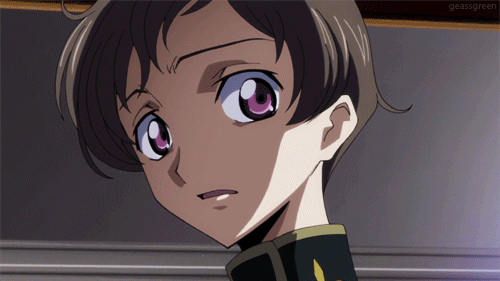
Having been raised by the Geass Order, Rolo never had a family, and hence any kind of social values or needs in him have been repressed very early on in order to effectively create a perfect killing machine. However, Rolo is still a human, and this kind of severe social deprivation has neither left his mind in good health, nor has it erased his actual need for any kind of social interaction.
Before his change we see that Rolo heavily avoids any actions that would lead him to cooperate with others, sacrificing the people he works with for the good of the mission without thinking twice about it. He rationalises these kinds of actions as being the most efficient and reliable way to complete a task, but in actuality this gives away a hidden insecurity - Rolo simply does not know how to deal with other people or even try to convince them of anything and the possibility of doing so elicits fear in him.
Because the inferior function is the one people have the least control over, having inferior Fe means that the user has low awareness and/or control over their social needs and that they may run into problems when dealing with societal norms and ethics (that’s not to say that Ti-doms are amoral, but a universal moral system can be difficult for them to deal with). Rolo checks all of these boxes, first convincing himself about not needing any kind of social aspect in his life and later, when he’s offered the opportunity to actually be part of a family, entering a Fe-grip and serving this new family unconditionally without understanding that his thinking is unhealthy for him. Even when he feels happy and is serving Lelouch, he’s constantly suspicious and afraid of losing his brother, which causes him to overreact on several occasions, causing the death of Shirley and almost killing Lelouch’s actual sister.
While he ends up dying with a smile on his face, Rolo was ultimately unhealthy for his entire life, following people who only looked to use him as a tool in their plans and never letting him grow as a person (both the Geass Order and Lelouch end up suffering for these decisions). In terms of MBTI his story is one that shows the importance of not neglecting one’s lower functions, as doing so will likely result in overindulging in them later.
However, please keep in mind that this is only my opinion on the matter and I will welcome any criticisms or alternative opinions to discuss them. If this article was interesting for you, stay prepared for next time, when I shall discuss the MBTI type of Kallen Kōzuki.
#mbti#code geass#code geass mbti challenge#Rolo#Rolo Lamperouge#ISTP#Ti#Se#Ni#Fe#fictional characters
38 notes
·
View notes
Text
How To Type Someone
After a lot of questions regarding this: here’s my full, long answer. Disclaimer that this is not 100% within the realms of the MBTI theory or the Jungian function theory. I didn’t get any of the interpretations from a direct external resource. This is the sense that I have made of everything that I have read and researched over the last few years, and this is how I have learned to type people.
Now, I’m going to split this post into three parts
How to type someone through overall type descriptions
How to type someone through identifying cognitive functions
How to actually identify each cognitive function.
MBTI Types Identification - General
I’m going to put a lot of techniques into this category, but this is basically all the ways to type someone without the use of cognitive functions.
(1) - dichotomies
So the first way to type someone or yourself is to go one by one and identify where they stand on each dichotomy distinction. Introvert or extravert? Intuitive or sensor? Feeler or thinker? Perceptive or Judger? A rundown of what all of these words can be defined as:
Introvert - less social, more introspective
Extravert - more social, likes to interact with outside world
Intuitive - conceptual and innate understanding of abstract ideas
Sensor - concerned with the concrete real world
Feeler - more subjective, emotional, easily moved
Thinker - more objective, thoughtful, thinks things through
Perceptive - unorganized, spontaneous, laid-back
Judger - organized, prefers planning and structure
All very basic, simple, clean-cut. A lot of people consider these four dimensions to be scales rather than being either/or, so you type someone based on which of the two they’re closer to in each dichotomy.
(2) - descriptions
Because every combination of letters can lead to very different outcomes, it is sometimes more accurate to use the dichotomies to distinguish yourself in the letters that you are sure about, and then finalize your type by reading all of the descriptions of the potential types you could be (distinctions that you are unsure about -- often N and S). So read the descriptions about how each type’s personality is overall and see which description resonates with you more. Try different sources, not just one website.
(3) - stereotypes
Instead of reading the overall descriptions of the types (ie INFPs are idealists), try looking deeper into some habits that are associated with each type (ie INFPs are likely to enjoy all kinds of art, especially in the fantasy genre). Since stereotypes are more specific than broad terminology, they can be a better indicator of your or someone else’s type. Habits and behavior is much easier to notice, and since people's habits and actions more often than not are a result of their personality, they are likely to correlate. Of course, a person being an INFP may not be the cause of them daydreaming a lot, but it is a likely correlation. Not all stereotypes about a type have to apply to you for it to be your type, but since these are specific things, if a lot of the stereotypical habits of a type match up with you, it is likely your type.
(4) - personality tests
One of the easiest ways of determining a person’s personality type can be simply by asking them to take a personality test. Now, there are a lot of tests out there you can take, and they are all different. The ones that I’ve seen pop up the most are the 6 personalities test, the Similar Minds test, the Similar Minds cognitive functions test, and the Human Metrics test. You can also go with the 123 test, the Psych Central test, or the Celebrity Types test. There are a lot out there. If you are ever unsure of your type, try multiple tests. They all have their pros and cons that I will not go into right now, but here is a good accuracy review that you can use as reference, rating the Keys 2 Cognition test the highest.
There are many more tests out there are well, but the one I personally like the most is the Similar Minds cognitive functions test simply because it opens up the door to the cognitive function theory.
Speaking of which... let’s see how to type people according to their cognitive function stack.
MBTI Types Identification - Functions
The sheer basics can be found on my Functions page. Give it a read if you do not know the basics about the Jungian cognitive functions and how they stack up in order to form a type, and let’s get straight into it.
(1) - dominant/auxiliary functions
This is how I type most people and how I type songs while making the MBTI playlist. For this, you just have to pinpoint the most prominent cognitive function in a person, what they do without thinking, their most natural or obvious inclination. To give a few examples, for a person who likes being in charge, it might be Te. For a person who has a wild imagination, it might be Ne. Just look for the biggest and most prominent part of their personality that correlates with one of the signs.
Once you have chosen the first function, know that you know have two types that this person could be. If the first function was Te, the second will either be Si or Ni. When your options are limited, it can be easier or harder to type. Every case is different. Pick whatever seems more appropriate.
Now, the third part is identifying which function is dominant and which is auxiliary, and for this you actually have to identify their third (tertiary) function. Why? Because the third function balances out the second, so whichever function seems to have a balance is going to be your auxiliary function. The one that is imbalanced and dominating in its own right is going to be your dominant function. If you identified the first function as Te and the second as Si, and you feel that the Te is more balanced because although they like being in charge, saying what’s on their mind, and being definite, they are also the kind of people who say what they personally feel is appropriate (Te auxiliary, Fi tertiary) rather than not judging appropriateness at all before they say things (Te dominant, Fi inferior). At this point, you have their stack sorted out, and this person is ISTJ according to their stack.
(2) - introversion/extraversion tendency
Follow the first two steps of the last approach, but after that, instead of identifying the tertiary function to figure out the order, judge whether they are more introverted or extraverted – not just in the social sense, but do they interact with their environment more or are they more introspective and in their mind? If you know whether they exist more in the internal dimension or the external dimension, and you know their strongest inclination for each dimension, you can safely judge whether their dominant function is introverted or extraverted. Be careful doing this though because more often than not, the extraverted tendencies show themselves more than introverted tendencies, so be careful. You can also judge based on the social aspect because more often than not, it does correlate with their true internal/external tendency.
(3) - toxic people
If a person is toxic and/or overbearing, their dominant function will be extremely prominent and used in a negative way. For that, educate yourself on how each function is when it is toxic, and if you see those tendencies in a person, it will almost always be their dominant function. Once you have the dominant function, again you’ll have two choices as the auxiliary function, and after that, you will have your full stack. For example, if the person in the ongoing example hated stepping out of their comfort zone and were very stuck up about doing things the way they’ve always done it, never taking a risk, this is a toxic version of the Si function. If much of this toxic behavior comes out verbally and brashly, you can also pinpoint the Te. The person is as a result an ISTJ.
(4) - in the loop
This is also another example of an unhealthy personality, and it is when you’re noticing two functions in them that are very prominent that are both introverted or both extraverted, and either side doesn’t balance the other one out. This is because the auxiliary function is being repressed. If a person has more-than-normal introverted inclinations and next-to-no extraverted inclinations (like quite a lot of people on this website), chances are that their personality is very unhealthy, and they are stuck in an introverted loop. Their function stack is: Xi Xe Xi Xe. You can now pinpoint their functions by looking only at the first and third function. If this is a person that gets offended very easily, doesn’t like being told that they are wrong, and takes everything very personally, their first function is probably Fi.
Now, their tertiary function could either be Si or Ni. So you have to look at… well how do they create the opinions that they believe are so superior to everyone else’s? Is it how they have always felt or due to experience that others are too ignorant to understand, or is it based on a very theoretical sense of right and wrong that they believe others are too stupid to be able to comprehend? The first would make them Si, the latter Ni. In the first case, they would be INFP, the latter ISFP.
^^ Now all of these are ways that you can identify someone if you are able to identify cognitive functions. How do you identify cognitive functions though?
This is a little bit more tricky
Cognitive Functions Identification
(1) - literal
This is basically putting 2 and 2 together and making 4. There are two components of a cognitive function. For example, for Ne, it is Intuition and extraversion. Let’s call Intuition the nature of the function and extraversion the dimension that it exists in (external dimension). See if you can pinpoint both things, and there’s your function. Instead of me giving you a singular example, let me tell you how to pinpoint each function like this.
Te - Thinking - Clear, objective, thought-based, not significantly affected by one’s emotions, like dealing with facts and logic. Extraversion - Outward expression of information, their preference for clarity often leads to organization of external environment. Together, this is Te.
Ti - Thinking - Again, clear, objective, thought-based, not significantly affected by one’s emotions, like dealing with facts and logic. Introversion - personal, do not deal with the outward expression of objectivity but internal knowledge and introspection, and their preference of clarity leads them to want to know everything about a subject. The 2 + 2 here is Ti.
Fe - Feeling - Subjective, emotional, dealing with what is appropriate, sense of right and wrong. Extraversion - deal with appropriateness, what is socially acceptable, affected by other people’s mood, feelings, and the atmosphere, prone to expressing feelings. Together, the two tendencies make Fe.
Fi - Feeling - Again, subjective, emotional, dealing with morality, sense of right and wrong. Introversion - personal, concerned with own perspective only, and again: subjective (not subject to a lot of external input or influence). Together, this is a feeling function that exists in an internal dimension, ergo Fi.
Ne - Intuition - Very concept-based, likes the figurative more than the literal, prone to making connections, instinctive not consciously done. Extraversion - make outward connections, vocal about their connections, have a random but identifiable train of thought to other people (external environment). Intuition in the external dimension is Ne.
Ni - Intuition - Again, very concept-based, likes the figurative more than the literal, prone to making connections, instinctive not consciously done. Introversion - make inward connections, relate ideas to concepts already known or through internally processed connections, and as a result, their train of thought is often not identifiable by other people (external environment). Intuition in the internal dimension is Ni.
Se - Sensing - Deal with the concrete and not the conceptual, very engaged in the real physical world, like the literal more than the figurative. Extraversion - like to use their senses to be fully in tune with the outside world and are fully present in any given moment, focus on the here and now, likely to be kinesthetic learners. The two make Se.
Si - Sensing - Again, deal with the concrete and not the conceptual, very engaged in the real physical world, like the literal more than the figurative. Introversion - heavily internalize what goes own in the outside world, use it as experience, also likely to be kinesthetic learners, attention to detail, rely on memory. Altogether, this is the equation for Si.
You see what I mean? Extremely literal. The core of the functions will always be feeling, thinking, intuition, or sensing, but adding the extraversion and introversion dimension to it literally is a good indicator of what that function does. Using this as a go-to can be very accurate.
(2) - descriptions
Now, when you read descriptions of overall types, the terminology can either include or exclude the cognitive functions. If this description is along the lines of “Because ISTJs have Si and Te as their strongest functions, they like an established structure” and it gives you an explanation of how this combination can lead to certain preferences in the type, this is what I mean by descriptions. You are starting with the overall type and then looking inward into the more specific components of the type. These descriptions will explain cognitive functions within the context of which type you are talking about. If you have a type in mind for someone, whether it is using the dichotomies or any other indicator that you are unsure about, this can be a good way to confirm or deny your suspicion.
(3) - stereotypes
Following how I distinguished descriptions and stereotypes before, stereotypes are much more specific, and they relate more to habits and don’t have to apply to everyone. This doesn’t discuss the functions within the context of any type but overall. Let me share some such explanations with you:
Te - organized, prefer structure, very decisive, make very objective decisions, prefer clarity, very direct and to-the-point, don’t tend to have a filter when they speak, like to voice what they think and correct people, in arguments more likely to talk than listen, look less towards logic and more towards basic concrete facts, very practical
Ti - much more scattered, not as objective in their thinking because they think of things for the sake of thinking about them, will think about space and aliens and the future, aren’t usually vocal about their thoughts, less direct, don’t draw a very rigid line between right and wrong, less likely to correct people, prefer logic more than facts, tend to like logic games, puzzles, and games like chess (things that have no practical value but stimulate their mind).
Fe - very social, know what’s socially appropriate and adhere to it, like keeping the mood, atmosphere, and morale up, easily affected by the aforementioned things, can feel when a person is feeling a certain way, easily connect with other people through their emotions, can be very convincing, tend to like pleasing people, don’t like arguments and fights
Fi - very personal, have strong opinions and can be a bit stubborn, don’t like being told that they are wrong, have a strong identity of self and it reflects in everything, prone to say “I feel” “I think” “In my opinion.” Need time to figure out how they feel about something, very subjective, treasure people’s unique perspective of things.
Ne - outward connection of ideas, like brainstorming, prone to go off on tangents when they are talking, love research, can find connections between seemingly unrelated things, wild imagination, used to create fantasy stories/art, love to theorize, use figurative language a lot, like to ask “what if,” stimulated by a lot of information, connect details to each other and to the bigger picture, like new opportunities and experiences
Ni - inward connection of ideas, relate theoretical ideas to themselves and process them inwardly, their thoughts are likely to go off on a tangent, and you’ll never know how they got from point A to point B, also like theories, have a strong sense of others, good at instinctive reasoning, pick up on small details, go from the big picture to the details
Se - in tune with the physical environment, generally like to do activities that heighten their adrenaline and stimulate their senses, quick to remember things they picked up on through senses (smells, colors, etc), very present-oriented more so than the past or future, don’t overthink things, it is what it is, more into concrete truth than concepts
Si - internalize the physical environment, tend to be past-oriented because they remember information from their environment and apply it in the future, treasure experience, tend to go with what they know, don’t like too much experimenting, reliable, tend to be very sentimental, remember specific dates and faces
You can find much more detail in this detailed post by me, but for now, this is enough. These are specific habits or tendencies that heavily correlate with each type, and if you an pinpoint a lot of these habits in a person, that function is likely to be one of their stronger functions.
(4) - toxic functions
Another way to type a person who has a toxic and imbalanced personality is to pinpoint a specific function that is in its toxic state. This function will usually end up being the dominant function. Let me reference you over to another old post of mine that lists a few tendencies of an unhealthy function. A function itself goes unhealthy when its counterpart is heavily underdeveloped, so a dominant function will be toxic because the inferior is undeveloped. This is why an unhealthy Te might be inconsiderate and brash (underdeveloped Fi), and an unhealthy Fi might be stubborn and easily offended (underdeveloped Te). You can use this to pinpoint singular functions.
Conclusion
This is basically all of the ways that I know to type a person: you can steer clear of cognitive functions and stick to dichotomies and descriptions representative of dichotomies. You can also use cognitive functions; you can look into the dynamics of the cognitive functions within a suspected type or use detected cognitive functions to deduce a person’s type.
There might of course be other ways to type a person, but if you’re asking me, this is the only help that I can provide you aside from answering your more specific questions, so make of this what you will ^^
#this is long#super long#so i haven't read it through a second time before posting it#if there are any mistakes#be it typos or wrong info or whatever#please tell me#i honestly don't have the willpower to reread it#kthnx#long post#oops#mbti#mbti theory#mbti functions#mbti types#myers briggs#myers briggs type indicator#carl jung#jungian theory#jungian function theory#ne#ni#se#si#te#ti#fe#fi
180 notes
·
View notes
Text
Sing MBTI

Buster Moon--ENTJ
“This show is not gonna save your theater! Maybe it's time to just move on.”
Buster Moon has an enterprising and goal oriented personality. He has dreamed big all of his life, and he has never let go of the grand visions he’s followed so tirelessly (Ni). He has a natural knack for taking charge and organizing large events and other people (Te) which he puts to good use in making his dreams come to life. Buster Moon has an eye for the aesthetic and cares a lot about quality (Ni-Se). His draw to the visual arts also show his extraverted sensing. And he never forgets what is meaningful to him, liking to be defined by his expertise in doing what he loves to do, as well as following what was meaningful to his family (Fi). As an intuitive, he can sometimes get a little more lost in his ideas than sticking to reality, but ends up serving him well.

Eddie Noodleman--ISTP
“This show is not gonna save your theater! Maybe it's time to just move on.”
Perhaps Eddie has led a bit of an easy life, but nonetheless, he clearly most enjoys the moment and the albeit laid-back experiences he has (Se). He often approaches situations with his own logical reasoning, thinking it’s often better just to let things go and move on in a realistic manner (Se-Ti). His inferior Ni can be seen in the way that he not only lacks a future plan or goal, but more importantly that this doesn’t seem to bother him at all. Eddie is happy to live in the moment and mostly take things as they come.

Nana Noodleman--ESTJ
“Oh, lucky me. If it wasn't for my useless grandson and his ghastly little theater friend.”
Nana Noodleman isn’t afraid to voice her opinions. She enjoys the glorious sensory world of the theater, and she would love things to remain as they had been before, enjoying reliving all the experiences and the memories (Si). It’s quite important to Nana that her wishes and decisions are taken seriously, and she regularly keeps the outer world and others in check (Te). She has a soft heart below that surface, though, and it’s especially when something reaches a deep, self-defining part of herself that she opens up a bit more emotionally (Fi).

Miss Crawley--ISFJ
“Johnny, your jacket is talking.”
Miss Crawley is very loyal and caring to Buster Moon and his wishes. Even though she is elderly and a bit slow, she works tirelessly to get everything done. To the extent of which she is capable, she is careful of details and wants everything to be right. Miss Crawley dedicated and loving, and it clearly upsets her greatly when something she’s done hasn’t met expectations or wasn't done quite correctly.

Rosita--ISFJ
“Norman, would you please tell them what a good singer I am?”
Rosita is clearly a great mom, but what isn't so obvious from the surface is how great she is at singing. Even though she loves singing so much, her family and current life don’t leave much room for following that passion, so she puts it to the side (Fe over Fi). Though she does believe she can sing well, Rosita doesn’t pursue that life, sticking rather to what she knows and the way she feels things must be done (Si). She’s a bit hesitant to seek different possibilities (inf. Ne); she is hopeful to see the contest flyer, but she doesn’t race to the opportunity right away. The elaborate setup that allows her to go and audition shows some strong logic (Ti) and the importance of and comfort with routine in the household and great attention to detail (Si). She is alway very kind, understanding, and the first one to show emotional support when her fellow singers need it (Fe). Once she embraces a different side of herself, one more eager to explore all of her possibilities (Ne), she really shines.

Johnny--ISFP
“Dad, I don't want to be in your gang. I wanna be a singer.”
Johnny is kindhearted and tries very hard to do what will make his family happy, but his heart clearly isn’t in it, and for an ISFP, that’s clearly not a good place to be in. His soulful performances indicate his emotional sensitivity, and he’s generally pretty sweet natured and reserved. As much as he wants to make those he loves happy, Johnny’s strong desire to follow his dreams and do what is deeply meaningful to him end up leading him away, even in rather risky situations (Fi). In the end, nothing will really be able to stop him from doing what he loves--and he’s good at it, too; his father finally realizes this when he sees how important this passion really is.

Mike--ISTJ
“A penny? How dare you! I happen to have studied in the Lincoln School of Music!”
Though not extremely outgoing, Mike is very confident in his act and proud of what he can do. Perhaps not the healthiest personality, Mike’s world revolves greatly around his perceived self-importance. But still, his stick-to-it-ness (Si), his commanding nature that sometimes favors external logic (though unhealthy) over heart (Te), his strong belief in himself and his dreams (Fi) and the fact that it takes him a while to warm up to knew possibilities (inf. Ne) all point to his being an ISTJ. And even though he may not always be the most honest, Mike must be quite hardworking and dedicated as well with his musicianship, so not all of his pride is an over indulgence.

Meena--ISFJ
“I don't know, but...I wanna try.”
Meena is a reserved character who also suffers from shyness. She is also often held back by the fear of negative events possibly happening again (inf. Ne), and she tends to stick with a safe an trusted approach to her passion, singing by herself and dedicatedly listen to music as well. When she tries to audition, it’s largely the want to please her family that pushes her to do it (Fe). When she finally gets over her stage frights and opens up from her shyness, she is delighted to do what she loves and give the audience a wonderful time.

Ash--ISFP
“I am not singing this.”
An introspective type, Ash is initially held back by Lance, but even then, she isn’t afraid to take center stage and make music her way, even if it isn’t what the audiences are looking for at all. She bravely follows her passion regardless of the negative general opinions she gets in return plenty of times (Fi). She is thrilled when she can finally reach her audience and make them smile by being who she feels she is. She also loves the physical aspect of her art (Se), cranking the volume all the way up. Nothing bothers her more than the thought of having to play some song that isn’t her at all, and when she does compose her own song, it’s pulled straight from her heart.

Gunter--ESFP
“This stage is about to explode with major piggy power!”
This pig loves the spotlight. He shows great comfort in his physical presence (Se), and he doesn’t easily comprehend Rosita’s struggles in the area, which indicate a lack of Fe. Gunter will follow his act no matter what (Fi), not always leaving much room for the opinions of others. His Te is visible in the way he can be somewhat commanding around how the performance should be executed.
#sing#sing movie#sing mbti#mbti#myers briggs#requests#animals#animated characters#fictional characters mbti#entj#estj#istp#isfj#istj#esfp#isfp#buster moon#eddie noodleman#nana noodleman#miss crawley#rosita#johnny#mike#ash#meena#gunter#te#se#si#ti
103 notes
·
View notes